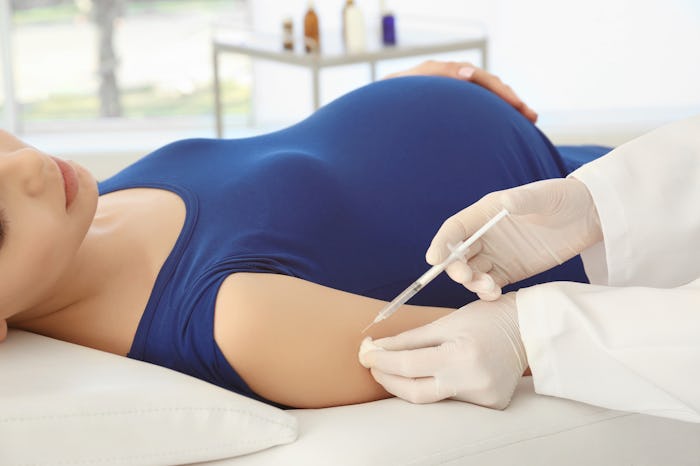Life
Study: Getting The Tdap Vaccine During Pregnancy Does Not Increase Autism Risk In Kids
Despite having scientific data that supports the benefits of vaccinations, it's still a hotly debated topic, especially amongst parents. On both sides of are strong-held beliefs about the role and results of vaccinations for children, but a new study may help to settle at least part of this debate. As new research has found, getting the Tdap vaccination in pregnancy does not increase risks of autism in children.
The study was meant to evaluate the safety of the tetanus, diptheria, acellular pertussis vaccine, given prenatally, and was conducted by Kaiser Permanente, according to the journal Pediatrics. It included a sample size of more than 80,000 children born over a four-year period, according to the study. Among those children, results showed that 1.6 percent — or 1,341 children — were diagnosed with autism spectrum disorder (ASD). And among the group whose mothers were vaccinated the rate of ASD diagnosis was 3.78 children per 1,000. Among the group who was not vaccinated, the diagnosis rate was 4.05 per 1,000, as the research found.
The lower rate among the group who were vaccinated might be explained by the potential for infections among unprotected mothers. Infections that cause high fevers have been found in increase the risk of ASD, according to the study’s authors.
“Our results potentially indicate that the maternal Tdap vaccine affects immune trajectories protecting infants against infections that would otherwise lead to neurodevelopmental alterations," the authors wrote in their findings and also noted that previous studies have shown no increase in risks like preterm delivery or low birth weight when women are given the Tdap vaccine.
The vaccine was created to protect against three serious diseases, according to the Centers for Disease Control and Prevention. Pertussis, also known as whooping cough, is of particular concern for newborns as it can create life-threatening complications like pneumonia; about half of babies that come down with whooping cough end up in the hospital, according to the CDC. The CDC recommends that pregnant women receive the Tdap vaccine during every pregnancy between 27 and 36 weeks, preferably toward the earlier end of that period. Since whooping cough is so contagious, and easily passed from person to person by coughing or sneezing, the CDC also recommends that everyone who will be around a newborn be up to date on their own Tdap vaccine.
Some people who are opposed to vaccines during pregnancy and for newborns cite concerns over thimerosal, a preservative often used to keep vaccinations from being contaminated with bacteria, according to CNN. But according to one study published in the American Journal of Preventative Medicine, there was no difference from the United States in the rate of ASD diagnosis in Sweden and Denmark, where thimerosal is not used at all. In the United States, the preservative was removed from childhood vaccinations beginning in 2001, as CNN reported, and any shots now should only contain trace amounts.
One author of this new study, Hung Fu Tseng, PhD, of Kaiser’s Department of Research and Evaluation, told news station WNDU:
The link between vaccination and development of autism has been refuted by many rigorous scientific investigations. Unfortunately the misconceptions still generate concerns. Given the increasing practice to vaccinate women with Tdap vaccine, it was important to address the concern of a link between maternal vaccination and subsequent development of autism spectrum disorder in children. We hope that our findings reassure parents that Tdap vaccination during pregnancy was not associated with autism in children.
This study appears to be the largest of its kind ever conducted, according to the authors. The babies followed were all born at Kaiser hospitals across Southern California, but there was no difference in the diagnosis rate there compared to the general diagnosis rate across the United States, as reported by Pediatrics.
The ages and education levels of the mothers were evenly spread across a range from under 25 years old to over 35, and less than a high school education to greater than a master’s degree, as the study showed. Hispanic mothers were most likely to opt for the vaccination, with 48.1 percent choosing to have it. Caucasian mothers chose the vaccination 26.4 percent of the time, followed by 16.3 percent of Asian American or Pacific Islander mothers opting for it. Just 6.3 percent of African American mother decided to be vaccinated, as the research found.
There is no doubt that the question of vaccinations can be confusing for expectant mothers. But hopefully this new research will allay some fears and provide increased protection.
